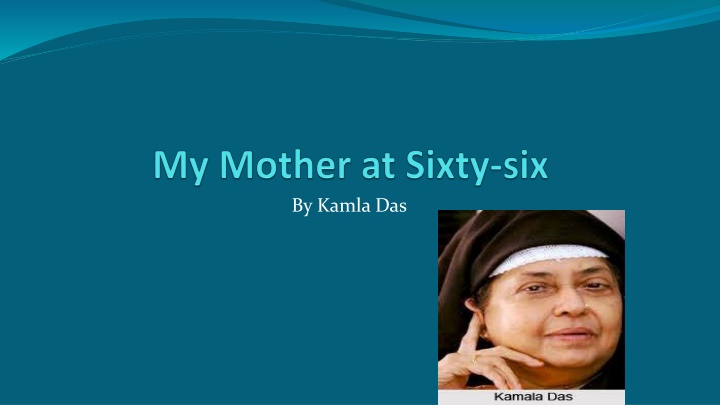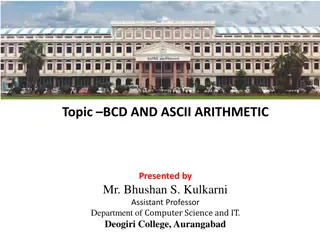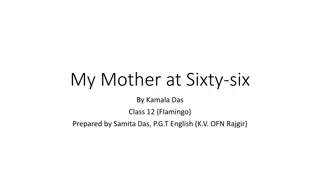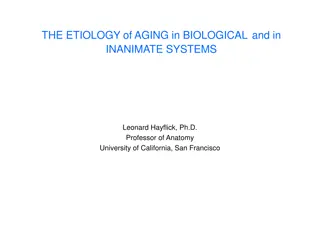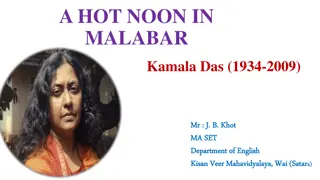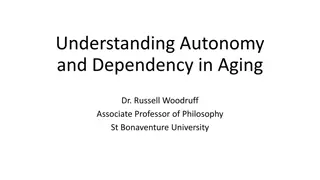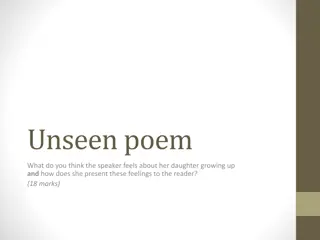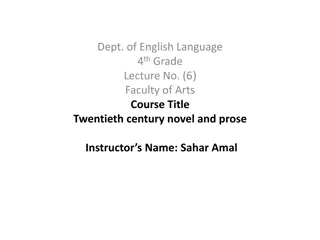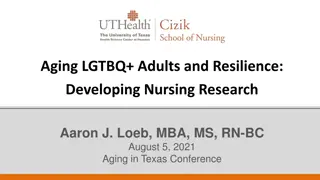Reflections on Aging and Mother-Daughter Relationships in Kamala Das' "My Mother at Sixty-Six
Kamala Das' poignant poem "My Mother at Sixty-Six" explores the stark reality of aging as the poetess confronts her mother's mortality during a car ride. Through vivid imagery and emotional depth, Das captures the nuances of the mother-daughter relationship, addressing themes of aging, fear, and acceptance. The poem beautifully portrays the bittersweet emotions that arise with the passage of time, highlighting the vulnerability and strength inherent in familial bonds.
Download Presentation

Please find below an Image/Link to download the presentation.
The content on the website is provided AS IS for your information and personal use only. It may not be sold, licensed, or shared on other websites without obtaining consent from the author.If you encounter any issues during the download, it is possible that the publisher has removed the file from their server.
You are allowed to download the files provided on this website for personal or commercial use, subject to the condition that they are used lawfully. All files are the property of their respective owners.
The content on the website is provided AS IS for your information and personal use only. It may not be sold, licensed, or shared on other websites without obtaining consent from the author.
E N D
Presentation Transcript
About the Poet Kamala Das (1934-2009) was born in Malabar, Kerala. She is recognised as one of the foremost poets of India. Her works are known for their originality, versatility and indigenous flavour of the soil. She has published many novels and short stories. She wrote under the pen name Madhavi Kutty . Her subject matter is basically related to her personality, sensitivity, and anguish. External factors do not reflect in her writings. Her writings bring out her true inner feelings. In the poem My mother at sixty six , she talks about her mother. This poem is based on the relationship between mother and daughter and the she shares her feelings for her mother.
My Mother at Sixty-Six - Poem Driving from my parent s home to Cochin last Friday morning, I saw my mother, beside me, doze, open mouthed, her face ashen like that of a corpse and realized with pain that she was as old as she looked but soon
put that thought away, and looked out at Young Trees sprinting, the merry children spilling out of their homes, but after the airport s security check, standing a few yards away, I looked again at her, wan, pale as a late winter s moon and felt that old familiar ache, my childhood s fear, but all I said was, see you soon, Amma, all I did was smile and smile and smile......
Vocabulary Doze: nap Ashen: pale Corpse: dead body Spilling: let out Wan: dim, weak Pale: dull, colourless
Explanation While driving to Cochin from her parent s home, the poetess mother accompanied her in the car to see her off. She sat beside the poetess. At one moment when the poetess turned and looked at her mother, she noticed that her mother was dozing and her mouth was open. Her face had turned ashen i.e., it seemed as if it had lost the vitality of life and her face looked like that of a corpse (dead body). The poetess was frightened as the reality seized her that her mother had grown old. She was not ready to accept it as old age is followed by death. So she tried to put the thought away.
She started looking out in order to take away the frightening thought from her mind. She noticed the trees sprinting in contrast to to her mother who looked lifeless while sitting beside her. She also noticed children coming out of their home happily. The happy children are representative of youth and power. Probably they were reminding her of the time when the poetess was a child and her mother was young. Then they reached the airport. After the security check at the airport, she again looked at her mother who was standing a few yards away. She again felt that old familiar ache of losing her mother who looked like a late winter s moon which loses its beauty in the fog. She felt that her mother had also lost her youth, vitality and had become inactive. She had a childhood fear of permanent separation from her mother. But she did not show it to her mother. She kept on smiling and smiling and said see you soon, Amma. These were the words of reassurance that they would meet again and she smiled in an attempt to hid her feelings. The lesson brings forth the emotions that a daughter harbours when she thinks about losing her mother.
